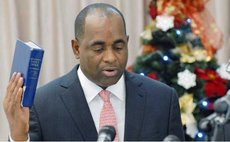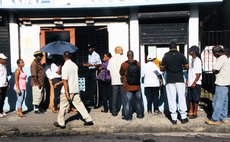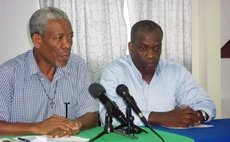For whom the bell tolls this election
Almost everyone believes that the upcoming general election, the eighth since Independence, will be one of the most closely fought contests. Although Prime Minister Roosevelt Skerrit has predicted a sweep-all landslide for his ruling Dominica Labour Party (DLP) indications are the DLP will have a difficult time holding on to the majority of the seats that it won in 2009. Our denouement is based on the fact that that even with the assistance of overseas voters who were transported here to vote, the DLP only narrowly won many seats.
The point is, it is anyone's guess which party will form the next government and many politicians and their supporters will become nervous wrecks as Election Day draws nearer.
Nevertheless, the electorate has to decide whether it should re-elect the DLP on the strength of its performance over the past 13 or more years, allow the Government some more time to complete its programmes or vote in the UWP with the hope that this party will do a better job. But voters must be careful.
Almost everyone repeats the cliché at one point or another – a promise is comfort to a fool. Yet many forget this wise statement as the politicians, who are now battling to remain in or to gain power, become increasingly outrageous with promises that often transcend reality.
We have been hearing these wonderful plans on the talk shows in particular for the past few months. And as the political climate becomes stormier and stormier so too will the promises become wilder and wilder. If they are repeated often enough we will believe them, the political strategists have surmised.
That is in spite of the fact that for decades this country has been pummeled by broken promise after broken promise, failed projects, economic disasters and excuses pilled upon excuses which, to say the least, insults the intelligence of the electorate. Hence, many electors are beginning to wonder whether it makes much sense to vote at all. The numbers of undecided voters are become larger and larger as people get more and more disillusioned with party politics. But we are told that abstention at the polling booth provides lop-sided representation and that a well-balanced parliament makes for better decisions for the overall good of the country.
Although the election date has not been announced and so the the manifestos of the two major political parties have not been made public, we should not expect many surprises when we do obtain copies. Apart from the time frame in which to build an international airport, the major plans and programmes of the political parties are the same. It has to be because there are so few options available for the development of Dominica.
So as the parties prepare to release their manifesto, we urge them, if that is possible at this late stage, to inject a fair dose of realism into the plans that they will present.
The fact is whoever wins the next general election will face serious challenges as they move to repair the severely damage economy. And to paraphrase a statement by a leading opposition politician: the government, whether UWP or DLP will need a resounding victory to be able to push through parliament tough policies if the economic fortunes of this country is going to swing towards prosperity.
A few of the challenges any government will face are the sluggishness of the agricultural sector, the country's large debt burden and the under-developed tourism industry.
Furthermore, no matter what the opposition says about its prospective relationship with the International Monetary Fund (IMF) when, or if, it gains power, the fact is the organisations which have the real clout are located in Europe, at the World Trade Organisation (WTO), the World Bank and the Caribbean Development Bank (CDB). These power brokers will undoubtedly inject their own brand of realism into the plans of the politicians as soon as they exit the political platforms and move towards Government Headquarters.
In addition, those of us who are old enough to have experienced several general election campaigns know that the gulf between campaign promises and the reality of day-today governance is as wide as the Caribbean Sea.
We are also familiar with the statements of prime ministers just after they have been elected to office. They all say that the previous administration badly mismanaged the economy, left the treasury empty and therefore their elaborately crafted economic and social development plans have to be put on the back burner. We have heard it before and we are likely to hear it again.
Nevertheless, it is up to the electorate, through civil society and the press, to put the matter of accountability at the top of the election agenda. Politicians who are prone to wild and wonderful promises must understand that the public will eventually hold them accountable. We should accept no more excuses.



